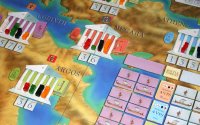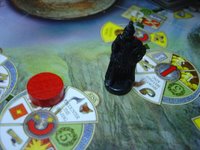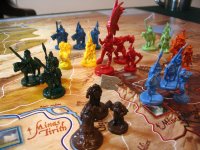Game Dump
 The past 2 weeks have been busier than usual. The good news is that some of that was playing games. Over 8 different sessions, I played a total of 21 games. I'm certainly not a quantity over quality kind of person, but if you can combine the two, even better.
The past 2 weeks have been busier than usual. The good news is that some of that was playing games. Over 8 different sessions, I played a total of 21 games. I'm certainly not a quantity over quality kind of person, but if you can combine the two, even better.I played another game of El Grande using my 2p variant. Clocking in at about 60 minutes, I have to say this variant gives a heck of a lot of enjoyment per unit of time--"gaming density" if you will.
On our normal gaming night at home, we played Cartagena, Tikal, and Carcassonne: The City--all with 3 players--followed by 2 games of Roma. The gaming density for all versions of Carcassonne is starting to feel on the low side. It's a great design, and fun to play, but somehow every game I play feels twice as long as it should. Perhaps it's a function of the extra time it takes when playing face-to-face. Tikal, on the other hand, is dense, even with occasional AP issues. Our first game of Roma was one of the degenerate types where one player just gets 2 Forums and gets perfect rolls for 3 rounds in a row. Our second game, however, was the best I'd ever played. It took over an hour. My opponent hovered around the 16-20 VP mark for a long time. He was able to keep 2 or 3 holes on my side most rounds, forcing me to shun my Forum for fear of an instant loss by attrition. It was a fascinating battle using and recycling many kinds of card combinations.
I finally got to experience Shogun, the reworked version of Wallenstein. It plays almost exactly the same except for the addition of bidding for turn order and special powers. I think the changes improve the game somewhat. They give you something else to use your gold for, and let you compete for the minor powers (+1 gold, +1 rice, +1 attack, +1 defense, and bonus army). The board is beautiful and double sided. The fact that it's an island makes the game feel a little more real, as well as allows for some longer sea connections. It has a similarity to Antike in that, although you are building a military force and conquering territory, you have to be mindful of the winning conditions so you don't get carried away doing the wrong things.
A few fillers--Catch Phrase, King Me!, and For Sale--carried 6 of us late into the night, to be ended with a fantastic session of Shadows Over Camelot. We were working together so well that, at the half way point, I was convinced there was no traitor. We carefully choreographed our movements and actions, playing on a knife's edge of losing outright. When we reached that vital moment when the last card needed to be played on the final quest, the player there got all pissed realizing she didn't have the "5". She had only gotten 3 hours of sleep the night before, so none of us thought much of it. However, on her next turn, she Accused another player who had shown absolutely no sign of being a traitor. Her identity was revealed! Fortunately for the knights, we only needed 3 more player turns to finish the game successfully. 9 White Swords. 11 Siege Engines.
On a lazy Sunday, we played Pheonix--one of Mary Ann's favorite new fillers. It's okay, but at 45-60 minutes for a 3-round game, it's a little too long for me. That night, I went to BSW to check out their latest addition: Venedig. I'll save my comments on this game for an upcoming podcast.
Our next game night at home was short. We played Jambo. It had been so long, we needed to refresh ourselves with the rules. I'm always interested in games that feel like Magic: The Gathering--which has worn out its welcome--without the collectibility or expansions. Next we played Medici vs Strozzi. I was worried Mary Ann would find this game a little too math heavy, but she loved it. For such a simple game, it's got a unique two-tiered force system at work that I will have to think about some more in order to describe.
For lack of a third on BSW, Linnaeus and I decided to try Bonaparte at Marengo on VASSAL and Skype. This game was the hit of the past 2 weeks for me. We had both previously read the rules at least once. Still, it has enough unusual, unexpected, and non-intuitive things that it is difficult to internalize. We had to stop after almost every action to see if we were playing properly. Our first game took 3 hours with the French winning by easily holding back the overly-passive Austrians. Our second game--with a better understanding of the rules and the tactics--ended with the French surrender at 6pm (morale 5-0) and took less than 2.5 hours. I think we can get it down to about 1.5 hours once we are more comfortable playing, but I don't see this game having long-term staying power. I'd prefer to play just once in a while to keep it fresh.
I just finished a game of Capitol on Ludoholic. I think it suffers quite a bit playing online. I came away not really liking it, but I'll certainly try it again face-to-face if the opportunity presents itself. That being said, the web implementation is decent.
Game night at the condo was lackluster once again. It took us over an hour to get started playing a 6-player game of Power Grid on the Benelux map. Even with this shortened version (only 14 cities), it took us over 3 hours to play. That left just enough time for a great 4p game of Ra. At the end of the first Epoch, I had the 2-3-5 Sun tiles. At the end of the second Epoch, I managed to upgrade these to the 2-3-6 Sun tiles. Even so, I ended the game with 6-7-10 and came in a distant second place.
On the same day that I decided to add more possibilities to our 6p game nights by reading the rules to Struggle of Empires and finally punching all the counter sheets (I had to make a new insert) to my year-old virgin copy, I was contacted by a fellow BGG'er to see if I wanted to join a group to play it online. So far, there are 13 of us from various time zones with various preferences for live vs PBEM play. My preference is, of course, live play. It's difficult to get 6 or so people to schedule several hours all at the same time, but I'm willing to try in order to play a game of this kind.
Bonaparte at Marengo image by Lord_Prussian











